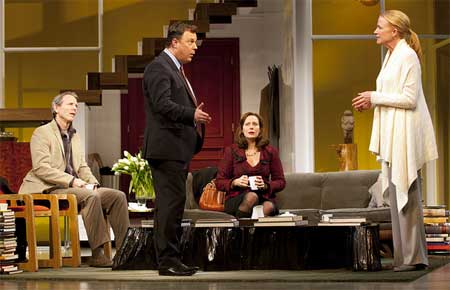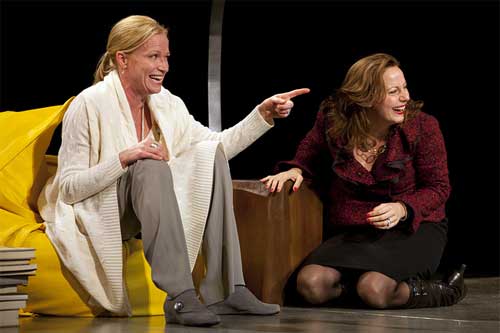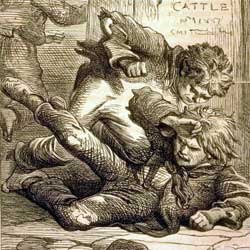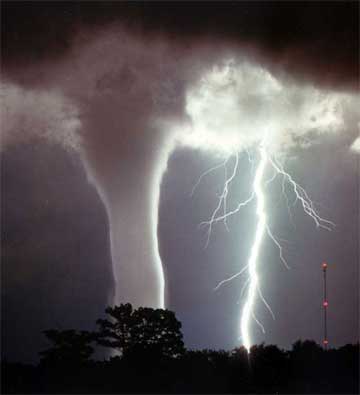Play (2006)
by Yasmina Reza
Translated by Christopher Hampton (2008)
Directed by Daniel Goldstein
Huntington Theatre Company
Boston University Theatre
Boston, MA
January 6 – February 5, 2012
With Johanna Day (Veronica Novak), Brooks Ashmanskas (Alan Raleigh), Stephen Bogardus (Michael Novak), Christy Pusz (Annette Raleigh)
Two couples come together to discuss a fight in which their eleven-year old sons have taken part. Annette and Alan Raleigh (Christy Pusz and Brooks Ashmanskas), trendy and upscale, are at the artsy-folksy home of Veronica and Michael Novak (Johanna Day and Stephen Bogardus). Centrally, quietly, elegantly, a vase of tulips adorns the room.
As the play begins, the four are diplomatically engaged in reconstructing the battle of the sons. The Raleigh boy has smashed the Novak boy in the face, requiring considerable dental work. The discussion continues, wavering between diplomatic niceties and pointed barbs, punctuated by the frequent work calls to Alan’s cell phone. The interactions morph and unravel in all kinds of directions: between the two couples and between the members of each of the two couples. Appearances are pulled away one by one and the raw and vivid interiors emerge finally to take center stage.

Photo: T. Charles Erickson
Courtesy of Huntington Theatre Company
When this show appeared on Broadway a few years ago, it had a decent run, peppered by quartets of famous stars from stage and screen. When I saw it, Alan and Veronica were played by TV idols Jimmy Smits and Christine Lahti. It was a refined performance, having the advantage of reworking over time that long Broadway runs offer. But, though I enjoyed the performance and found the play interesting, I was not captured by it in the way I had been, some years before, by Reza’s Art.
The current performance at the Huntington, however, did capture me. I am not sure whether it is a result of having seen the play before and having known what to expect, whether there was some gestation in the history of the play itself that resulted in a more penetrating result, or simply whether the Huntington production was so good.
The desired effect of this play requires a subtle combination of refinement and brutality. Art (1994) has its brutal moments, but is, in many ways, a more delicate affair. There, the bonds of friendship are tested by differences in taste and outlook. In God of Carnage, there are no bonds of friendship, only of diplomacy and marriage, and both of those are seen to rupture very easily. In Art, differences of outlook result in disappointment. In God of Carnage, those differences result in aggression.

Photo: T. Charles Erickson
Courtesy of Huntington Theatre Company
Whereas Art is a study in taste, meaning and relationship, God of Carnage has a much more existential drive to it. Taste and meaning are almost insignificant in its world, where the slightest peeling back of deception and misrepresentation reveal the horrifyingly contorted armatures beneath.
The title of the play, God of Carnage, reflects its existential texture, but one has to experience the stark contrast between the mundane circumstances of its conflicts, their faux cataclysmic implications, and the actual devastations to which it refers, to understand its ironic overtones.
At the same time as the opening of this performance of God of Carnage, the film Carnage, adapted from the play, directed by Roman Polanski, and starring Kate Winslet, John C. Reilly, Jodie Foster and Christoph Waltz, is newly in the movie theaters. It is also very good. Polanski also hits the existential chord very adroitly. (Look for the upcoming post.)
Having matinee idols to undress to their existential bones provides added appeal. However, without the headlining stars, this Huntington production is also extremely satisfying. It rides the knife edge between diplomacy and devastation in a very capable way and delivers its existential thump with gusto.
At times in the past, I thought that Huntington productions suffered from a kind of bland insulation which prevented them from being vivid and compelling. But something particularly good has been happening at the Huntington lately and this performance is a fine example of the kind of energy and verve coming from it.
In this production, when these four actors do their thing, real chaos – very appropriately – emerges.
Stephen Bogardus carries off the unexpected development of Michael’s character forcefully and believably. As Alan, Brooks Ashmanskas is appropriately annoying as the ever-on-the-phone lawyer; but he truly comes into his own in the silent struggle of dealing with his greatest loss, like a great big baby, hilariously.
Johanna Day, as Veronica, has to carry off the holier than thou role; but when she gets to imbibe and revel without restraint, she truly exhibits the redneck underneath the pulled-back blonde hair. Her single utterance about the benefits of alcohol is a luridly luminscent moment. And Christy Pusz as Annette gets the most dramatic, and disgusting, stage opportunity. It is completely gross, extremely funny, and she pulls it off very well. Compliments to the technical staff for engineering the very realistic effect.
Only one thing bothered me about the performance, which was how they consciously mispronounced the name of the French pastry dessert clafouti (as clafoo’tee rather than clafootee’). Even Americans know how to pronounce hors d’oeuvre, Camembert or Colbert. Call me nitpicky, but it sticks way out, even if one were only a modest Francophile. (In the movie Carnage, the translator went for cobbler, a better choice.)

Yasmina Reza is a probing, thoughtful and funny playwright. God of Carnage and Art (in production at the New Repertory Theatre in Watertown, 1/15 – 2/5/2012) are small masterpieces. This Huntington production of God of Carnage is witty, earthy and gutsy, and adeptly realizes the existential ironies called forth by Reza’s authorial talents.
– BADMan


Leave a Reply